Graham Reid | | 12 min read

Abigail Washburn was always going to work in China, but along the way she changed the how and the why of it. She started out aiming to be lawyer working in Chinese-US relations and maybe even a career diplomat, but these days – having picked up banjo and immersing herself in old time Americana music – she travels to China as a musician. And one fluent in Chinese, who sings Chinese songs in both countries, and works at the interface of cultural understanding.
Washburn -- who plays at the Taranaki Womad in March -- is rare musician. She was in the all-women traditional band Uncle Earl (their Waterloo TN album produced by Led Zeppelin's John Paul Jones), counts among her friend and fellows Ben Sollee and Bela Fleck (now her husband), and spends time with US and Chinese diplomats and party hacks when she tours regularly in China.
As well as being astute and smart, she is also very funny as the following interview with Elsewhere proves.
But first, let's find out how things are in her adopted hometown of Nashville these days.
Hiya Abigail, I'm calling you an area code 615 and I know of the band Area Code 615 out of Texas so I'm guessing calling you at home in Nashville. You've been there quite a while, what's the scene like now. It always seemed a vibrant scene but have you observed it goes up and down?
I have. I've only been here for 10 years but in that time it has. When I first came it felt like the town was really pop-country and Christian music dominated and I was really on the margins being part of the folk scene, even though some of the great folk artists live here, more than you'd find in any other town. But they were still on the margins.
But it's gone from being like that to now, maybe because of the diversification in the way records are made and sold and the fact that record companies are diminishing and independent culture is on the rise. Because of that there are all these wonderful scenes that are popping up all over Nashville. There was not a single bike lane in Nashville and now there are a quite few, so it's the valuing of public space, and parks so the sense of urban culture has changed. There are a lot of independent stores replacing chain stores and neighbourhood communities are really thriving. I'm thrilled about that because at first I found it a difficult town to be in, just in terms of lifestyle.
Now its evening out and there's a culture that is supportive of the arts and independent culture, and for urban design.
That suggests a new younger, educated demographic moving in.
I would say so. I'm sure that have been floods and flows of that, but it feels like right now there is a real draw of a different kind of celebrity to Nashville. It used to be the old country stars, New Country stars or the Christian rock stars. Now it feels like the indie rock, hard rock and jazz musicians are moving to Nashville. People who don't want to live the life you have to in New York or LA, they come here to live a better lifestyle and can do their music in a supportive place.
Jack White opened his studio there.
Yes, he has and he's had a big impact on the community. And Dan Auerbach of the Black Keys as well. There is starting to be this real reverence in my generation for the roots of country and blues, and how it has impacted. So people come in a notion of reverence.
 Let me ask you about that before we
talk about your rather illustrious career. This has always interested
me: that there is a generation of people under 35 with a real
affection for the old time religion songs and which listens to people
like Gillian Welch. But these are educated, secular people usually
from big cities yet they position themselves as if they grew up in
the Appalachians in some remote valley. Why do you think that is, are
they going back to some core value?
Let me ask you about that before we
talk about your rather illustrious career. This has always interested
me: that there is a generation of people under 35 with a real
affection for the old time religion songs and which listens to people
like Gillian Welch. But these are educated, secular people usually
from big cities yet they position themselves as if they grew up in
the Appalachians in some remote valley. Why do you think that is, are
they going back to some core value?
I don't know if its a core value, but I'm 35 and was in the first wave of that group and when I started there was only a handful of string bands. But now it seems there is this inundation of old American songs and culture into pop culture with Mumford and Sons, the Lumineers and others. And they are very popular and they are practically singing old gospel songs with a rock beat.
But they are singing to essentially a secular audience, and that's the disconnect I don't get.
I think it is probably about that feeling of wanting to connect and wanting to belong. You've probably thought about this a lot as a writer but I guess there are these waves of return because people can get pretty far out. In the Eighties and Nineties people pushed to the pop music extremes so maybe the new interesting thing is to come back around to the older sound.
We see that in the blues, every eight to 10 years there is a new discovery of the blues when some hotshot guitarist comes along.
Exactly, and people think 'Oh the blues!' but it's been around forever. I'm thinking about this a lot too because I'm trying to put together this particular project. I've been touring China for the past nine years and I've been going for the past 16, and I decided I wanted to take the next step and grow it. So I am trying to put together a US-China folk revival tour where I ring a bunch of wonderful progressive and thoughtful string bands to China and we tour and collaborate with local musicians. It's in an effort try to share the wonderful things that can happen when you reach back into the old of your own culture.
I guess the reason why I think this is a pressing issue is because I see the way globalisation is really bring a homogenizing of the culture to the world. Now some aspects are great because they bring more comfort to people and more of a sense of connection, but there is also a negative side in that people are losing interest in their own culture and I think the only way we can have a beautiful global future is for everyone to get more connected. But as they are getting more connected they are reaching back to their own culture to recognise what is special about it, and where they come from. So they have these cultural patchworks to exist within and to present themselves to others, otherwise we are just becoming one sort of blob.
I've noticed that in coastal China in the hot young connected generation that is there, but I've been to western provinces and the people there do seem closer to their culture and are proud of the ethnic minorities. When you travel around have you noticed the further you get from Beijing and Shanghai the more people are connected to their culture, or are they changing just as rapidly?
I think everyone is changing rapidly but I do notice what you are saying, there is a general appreciate of culture. There is a word in Chinese which means 'cultural industry' and there is a real respect from central government for a cultural industry in China. One part is coming from an ideological place which is recognising of the importance of diverse cultures, the other side is that this a great way to attract tourists to an area and a great way to make money so we need to present culture in a way which makes money.
And that's what 'cultural industry' means in China. So what I'm seeing is the more that the government values culture in China the more they squeeze authenticity out of it so it can become more and more consumer friendly.
I did notice that when I saw the ethnic minority villages where tourists go. That said, I also noticed very few Europeans are going there and it is mostly domestic tourism.
Isn't that wild? When I was going there in '96 there was barely a domestic tourist to be found, it was all foreigners.
So that's what China does and unfortunately in America, even though there is this generation of people which is catching on to this older music and liking it an using it as an inspiration, in general American culture or American government doesn't value the old culture in the way that might be useful.
China overdoes it and America underdoes it.
At the same time America is where we've had a folk revival. In the Sixties and Seventies it was huge and your big acts were Pete Seeger and Peter Paul and Mary who were filling stadiums and students were coming out to sing old folk songs.
So that is the idea behind this tour and what I'd love to do. It would be cool if the young Chinese people in the cities were riveted and magnetically drawn to this old culture and preserving it through their artistic expression today.
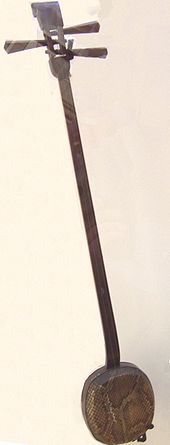
Yes, I think the timbre is similar but the banjo doesn't look normal to them. But when it is played I think the timbre and resonance feel familiar. Between the pipa and the yueqin – which is more of a circular head rather than the tear-shape of the pipa – or even the sanxian (right) which is more like a banjo with a snakeskin cover and bamboo neck and three strings . . . between all these lutes there is a real connection to the sound that comes out of the sound of the banjo. And a lot of Chinese songs were written for those instruments, so there is this canon of material which sounds wonderful on the banjo.
When I write songs in Chinese for the banjo it sounds so natural, the pluck of the banjo string sounds very similar to a Chinese word which is a consonant followed by an open vowel, which is resonant but doesn't last long.
I know you have spoken about how music can connect people and I believe that too in my heart of hearts, but most often it connects musicians with musicians, and musicians are never policy makers. Diplomats and politicians are not 'people' in that sense. They don't have much music in them.
You find that you are talking to people on a real level then there is the other stuff going on at a diplomatic level, which is the career you were once aiming for.
Yeah that's true. You watched my TED talk?
Yes, I've seen that.
Right, especially since I've been doing this for 10 years, if one's goal is to try to alter the outcome of potential conflict between US and Chin then policy is a way to try to do that. But changing the hearts of Americans into a positive culture experience with The Other, the foreign entity, is a very powerful way to change the subconscious and any wave of emotion and concern about an issue. In my belief that is incredibly valuable and it also brings a sense of peace to people's hearts rather than a top-down approach.
I think it can have further ramifications than me just singing a song in Chinese and people going 'Oh, Chinese sounds kinda cool, I like that, it's not that different'. That's the quick hit but the other thing that happens is 'Oh people who are foreign and different to me can also be beautiful'. That is the deeper message.
I just have to go around with my idealism and spread my message and its positive thing, and for me to feel that in the audience.
The thing I would observe about Middle America in the broad response to China is that [China] is a big economic power which is growing and we should be frightened of that as it challenges our global dominance and can overwhelm us. A sense of fear. Which of course can be eroded by cultural contact.
I think so.
Although every time they lock up someone like Ai Wei Wei things takes a few steps back.
(laughs) Although most of Middle America doesn't realise that is going on.
No, I don't think it would, not being cynical but just don't think he's on the radar. What took you into Chinese studies in the first place?
A combination of curiosity and that my first chance to study Chinese was one where I could go to China. At that moment I was excited to be away from home for the first time and learning about the world from is new perspective. I was in college and could spend my summers going to China, this totally new land, and I was brought in by that. Curiosity and adventure . . . and I sure got.
A big dumb question because I studied Chinese philosophy at university – and came out no wiser. I remember asking my professor about something political and he said the first thing I needed to understand was the minute I thought I understood it, I wouldn't be understanding it at all. But do you understand China in the broad sense?
Umm, that's a good question . . . I was a minor in philosophy. I think on a relative scale I understand it probably more than most Americans. And I understand it well enough to understand exactly what you are saying, which is I have no sure footing and I don't know what is going to happen next, and I'm in and out at the same time. I can love it and it can love me back, but it could end at any moment.
Do people in the diplomatic corp approach you from time to time, because I'm guessing you would have more on-the-ground knowledge than most.
Yes, in the last 10 years people in the US diplomatic corp have to move through fast so there is no nepotism, no favouring, no deals under the counter and people giving away visas for money and that kind of thing. So over the last 10 years I have watched three or four waves of diplomatic people come and go. Every time a new one comes I need to go and reintroduce myself and explain what I'm doing and how we've done it in the past and what works and what does. People come in with their assumptions and sometimes they are good and sometimes they are not.
So they do approach me and every time I play in China I would say 25 percent of the gigs I do are State Department funded and supported, and they bring out a crowd and local officials.
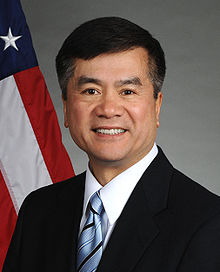 And the new ambassador Gary Locke is of Chinese
background so I guess that helps?
And the new ambassador Gary Locke is of Chinese
background so I guess that helps?
Yes, I just got to meet him in December and he is very popular. I think people are thrilled there is an acknowledging of the aspect that I Chinese-American in America. I feel for Chinese-Americans going back to China though. Ambassador Locke really doesn't speak Chinese but he is treated with the utmost respect.
But if you are Chinese-American young person going to university in China, people are pretty cruel. I get in a taxi with my Chinese-American friends and I start speaking Chinese and they go 'Oh my gosh you speak Chinese so good' and my Chinese-American friend will say a few phrases and they will say 'Oh your Chinese is horrible, how can you do this to our country?'
You have observer status in these things because you are a musician and musicians are widely respected and otherwise considered fairly harmless creatures.
True. Although China is very careful about what is cultural influencing their people, so as much as we are kind of harmless – and we aren't like journalists, not those bad types – we could still influence culture. So if you get to be on a stage you have to have a certain awareness as to what would really offend the Chinese government. I don't go to China to say 'Free Tibet' like Bjork does because I want to have a long relationship with China.
What I care about is a slow transformation to effect real change. Activist action does that too, but it just has certain repercussions for the people who do it.
So they are not going to check your setlist like they do the Rolling Stones?
Well partly because I'm not filling arenas. If I started filling arenas I guess I will find out what I can and cannot sing. It's changing . . . but I'm not saying that's because people feel more free. Most people still feel very careful about what they say.
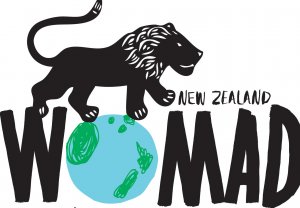 That's been my experience. Very
generous and hospitable people but cautious sometimes in ways that we
wouldn't feel in our own country. But that is understandable given
the long and ancient history.
That's been my experience. Very
generous and hospitable people but cautious sometimes in ways that we
wouldn't feel in our own country. But that is understandable given
the long and ancient history.
Absolutely and I'm glad to hear you say, that because a lot of people think it's communism and that's a really easy go-to place for Americans. 'Oh they are commies' No, it's been a continuous part of Chinese culture, it is a dynasty and a mutating and transforming empire in the way they have always kept things under the cap and kept control of society.
Confucianism as much as anything else.
Exactly, that Confucian web is very important.
Womad Taranaki, New Zealand: March 15-17 2013. For more on Womad 2013 artists at Elsewhere see here.
The Womad website for ticketing and information is here.



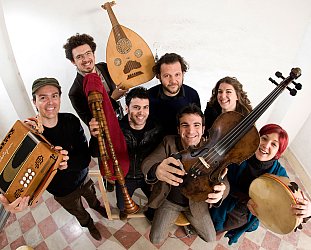


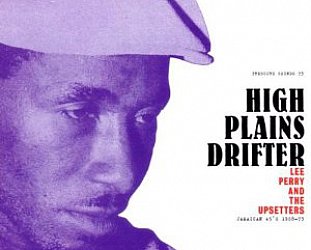
Clive - Feb 25, 2013
Great interview Graham,I did not know of her chinese connections and you are correct a very bright lady.I do a lot of buisiness with China and have a lady Chinese agent.What amazes me is the integrity of the people and their politeness,however you will never change China,it is not communist and as Abigail says it is a Dynasty.Democracy would just not work there,you often wonder if it is working here.Now back to the Appalacians,I have 2 uncle Earl CDS,2 Abigails and an Abilgail and the Sparrow Quartet Cd.You article has inspired me to play this great roots music tonight which means a hold o the Nevilles and Magic Slim(RIP)
SaveJamie Macphail - Mar 25, 2013
So glad you posted this Graham. At Womad she made so many references to China, and obviously it was apparent in her music that the bond is very strong for her. Did you know that she has written a play which opens very soon at Joe's Pub in NYC? It's about these things that you and she spoke about. It's called Post-American Girl.
Savehttp://www.abigailwashburn.com/website/post-american-girl/
post a comment